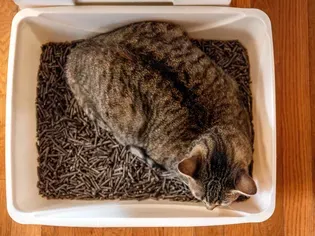Why Is My Cat Sleeping in Their Litter Box?
Updated on 04/26/24

Why Is My Cat Sleeping in Their Litter Box? Delve into the Puzzling Phenomenon
Cats, those enigmatic companions, often engage in behaviors that leave us scratching our heads. One peculiar habit that can cause concern is when a cat decides to make their litter box their sanctuary for slumber. While not always a cause for alarm, understanding the underlying reasons behind this behavior can provide valuable insights into your feline friend's well-being.
Delve into this comprehensive guide to explore the myriad of factors that may be contributing to your cat's litter box sleeping preference.
Physiological Reasons:
* Urinary Tract Infection (UTI): Pain and discomfort associated with a UTI can make it difficult for cats to find a comfortable position outside the litter box. The litter's texture and absorbent nature may provide some relief from the irritation.
* Constipation or Diarrhea: Similar to UTIs, digestive issues can create discomfort and lead cats to seek solace in their litter boxes. The increased warmth and absorbency can help soothe their sensitive stomachs.
* Kidney Disease: Advanced kidney disease can cause increased thirst and urination, leading cats to spend extended periods in their litter boxes. Sleepiness and lethargy are also common symptoms of this condition.
Behavioral Reasons:
* Stress or Anxiety: A stressed or anxious cat may retreat to their litter box as a safe and familiar place. The enclosed space and familiar scents can provide a sense of security and reduce anxiety levels.
* Territory Marking: Cats mark their territory through scent marking, including sleeping in strategic locations. If another cat or animal has entered the home, your feline friend may be trying to establish their dominance by sleeping in their litter box, an area they strongly associate with their territory.
* Boredom: A bored cat may turn to sleeping in their litter box as a form of entertainment. The unique texture and scratching sounds can provide some stimulation and distract them from their boredom.
Medical Conditions:
* Neurological Disorders: Certain neurological disorders, such as feline cognitive dysfunction syndrome, can impair a cat's ability to recognize familiar objects and places. This confusion may lead them to sleep in their litter box, mistaking it for a safe and comfortable sleeping spot.
* Arthritis or Joint Pain: Painful joints can make it difficult for cats to sleep comfortably in other areas of the home. The soft and absorbent texture of litter can provide extra support and cushioning, easing their discomfort.
Environmental Factors:
* Lack of Clean Sleeping Area: If your cat's usual sleeping spot is dirty or uncomfortable, they may seek out the cleaner and more absorbent litter box as an alternative.
* Cold or Uncomfortable Environment: Cats prefer warm and cozy environments. If their regular sleeping area is cold or drafty, they may choose the litter box as a warmer and more sheltered place to rest.
Addressing the Issue:
* Rule Out Medical Conditions: Consult with your veterinarian to rule out any underlying medical conditions that may be contributing to your cat's litter box sleeping behavior.
* Reduce Stress and Anxiety: Identify and address any stressors in your cat's environment, such as new pets, changes in routine, or lack of attention.
* Provide a Comfortable Sleeping Area: Ensure your cat has access to a clean, comfortable, and warm sleeping area in a quiet and safe location.
* Increase Environmental Enrichment: Provide plenty of toys, scratching posts, and climbing structures to keep your cat mentally and physically stimulated and prevent boredom.
Conclusion:
Understanding the reasons behind your cat's litter box sleeping behavior is key to addressing the issue effectively. By considering various factors, from physiological conditions to behavioral and environmental influences, you can help your feline companion find comfort and a peaceful night's sleep in their designated sleeping spot. Remember, consulting with your veterinarian is always recommended to ensure your cat's health and well-being.
Explore More Pets

Cat Behavior Problems
How to Stop Aggression in Kittens

Long-Haired Cat Breeds
Siberian Cat: Breed Profile, Characteristics, & Care

Cat Behavior Problems
How to Stop Kittens From Scratching and Biting

Long-Haired Cat Breeds
Turkish Angora: Cat Breed Profile, Characteristics & Care

Basic Training
How to Socialize Your Kitten

Short-Haired Cat Breeds
Cute Pictures & Facts About Calico Cats & Kittens

Litter Box Training
Training Your Kitten to Use the Litter Box

Long-Haired Cat Breeds
10 Fun Facts About White Cats